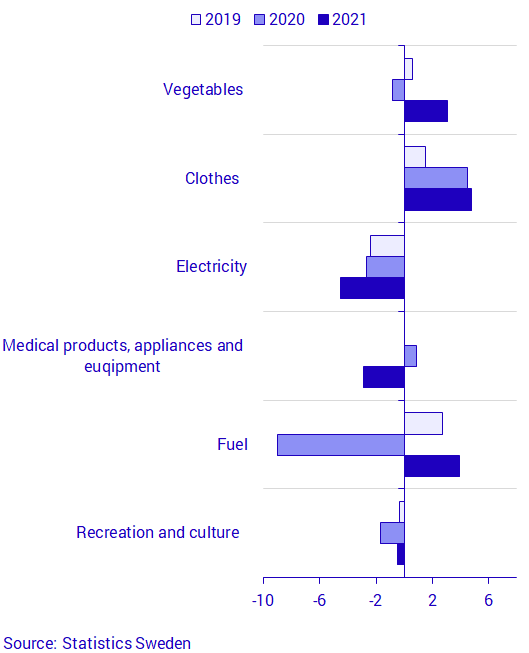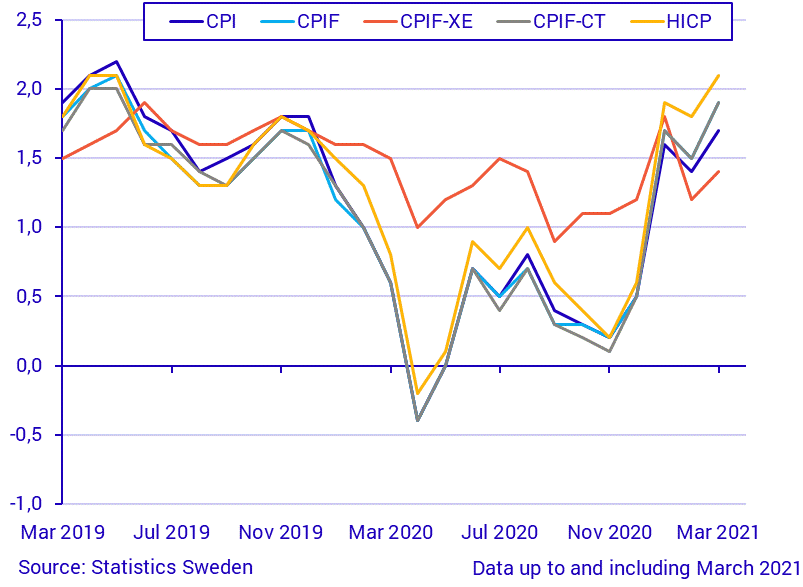Consumer Price Index (CPI), March 2021
Inflation rate was 1.9 percent in March 2021
Statistical news from Statistics Sweden 2021-04-14 9.30
The inflation rate according to the CPIF (Consumer Price Index with fixed interest rate) was 1.9 percent in March 2021, up from 1.5 percent in February. The change on a monthly basis between February and March was 0.2 percent.
“The rise in the inflation rate in March is largely explained by price increases on fuel, as well as price increases on vegetables such as peppers and tomatoes. Fuel prices were relatively low in the same month a year ago, but have now recovered,” says Beatrice Ljung, statistician at Statistics Sweden.
In brief
| Index Numbers |
Monthly changes, percent |
Annual changes, percent |
|
|---|---|---|---|
| CPI (1980=100) | 339.54 | 0.2 | 1.7 |
| CPIF (1987=100) | 222.38 | 0.2 | 1.9 |
| CPIF-XE (1987=100) | 209.67 | 0.3 | 1.4 |
- Prices on fuel increased and explained a large part of the rise in the CPIF inflation rate.
- The inflation rate according to CPIF excluding energy increased from 1.2 percent in February to 1.4 percent in March.
- Prices increased on vegetables in March.
- 0.8 percent of the basket was imputed due to absence of consumption.
Higher fuel prices offset by lower electricity prices and book sales
The CPIF increased by 0.2 percent from February to March. In the corresponding period a year ago, the CPIF decreased by 0.2 percent.
The main contribution to the CPIF monthly rate came from rising transport prices, in which fuel prices were the main driver of the upturn. Prices also rose on clothes and vegetables. The upturn was partly offset by lower electricity prices, among which spot prices fell in all electricity areas. In addition, prices decreased within recreation and culture, mainly due to book sales and falling prices in the group audio-visual, photographic and information processing equipment. Further, prices fell in the group medical products, appliances and equipment, mainly on eyeglasses following several campaigns.
The table below shows changes on a monthly basis and contributions to the CPIF based on the goods and services that had the greatest impact on the CPIF in March 2021. The results are presented by COICOP category; COICOP refers to the United Nations classification of household consumption expenditure.
| Category (Coicop) | Monthly changes, percent |
Contribution to CPIF Monthly change, percentage points |
|---|---|---|
| Vegetables (01.1.7) | 3.1 | 0.1 |
| Clothes (03.1) | 4.8 | 0.2 |
| Electricity (04.5.1) | ‑4.5 | ‑0.2 |
| Medical products, appliances and equipment (06.1) | ‑2.9 | ‑0.1 |
| Transport (07) | 1.3 | 0.2 |
| Fuel (07.2.2.) | 3.9 | 0.1 |
| Recreation and culture (09) | ‑0.5 | ‑0.1 |
| Audio-visual, photographic and information processing equipment (09.1) | ‑2.7 | ‑0.1 |
| Books (09.5) | ‑15.5 | ‑0.1 |

Seasonal patterns and temporary price changes
Price changes on goods and services may be seasonal or temporary. The figure above shows the monthly changes this year and in the two most recent years for the goods and services with the largest impact on the CPIF monthly change.
Fuel prices rose in March 2021, in contrast to the same period in 2020, when fuel prices fell considerably due to falling crude oil prices. For clothes, the price increase was seasonally normal and largely in line with the 2020 upturn, but was slightly higher than in the same period in 2019. For vegetables, prices increased in March this year, like in 2019, while in the same period in 2020, prices decreased. For some product groups including Chinese cabbage, peppers, leek and tomatoes, prices increased sharply and contributed to the upturn in the current period.
Prices on electricity fell in March, as they did in the same period in the last two years. Likewise, prices on recreation and culture fell in March in recent years. However, the downturn for the group medical products, appliances and equipment in this period deviated from March 2020 when prices increased.
Contribution to the inflation rate in March
The inflation rate according to the CPIF, that is, the change in the CPIF over the past 12-month period, was 1.9 percent in March 2021. The inflation rate increased from 1.5 percent in February.
The inflation rate was affected mainly by rising housing costs, in which electricity was the main driver of the upturn. Despite falling prices from February to March, prices on electricity in March 2021 were higher compared with the same period a year ago. In addition, prices increased on transport and other recreational items and equipment. Within transport, prices on fuel in particular were higher. Prices also increased on clothes and shoes. These price increases were offset mainly by falling prices within the group audio-visual, photographic and information processing equipment.
The inflation rate according to the CPIF excluding energy was 1.4 percent in March, up from 1.2 percent in February.
| Category (Coicop) | Yearly change, percent |
Contribution yearly change CPIF percentage points |
|---|---|---|
| Clothes and shoes (03) | 4.4 | 0.2 |
| Housing (04) | 3.5 | 0.8 |
| Electricity (04.5.1) | 10.1 | 0.3 |
| Transport (07) | 4.9 | 0.6 |
| Fuel (07.2.2) | 10.3 | 0.2 |
| Audio-visual, photographic and information processing equipment (09.1) | ‑9.5 | ‑0.3 |
| Other recreational items and equipment (09.3) | 6.4 | 0.2 |
Other measures of inflation
Statistics Sweden calculates different inflation measures for different purposes. The CPIF is the Riksbank’s target variable, while the CPI is the measure used for purposes of compensation.

Effects of the coronavirus pandemic on calculations
As a result of the coronavirus pandemic, some services in the CPIF basket were unavailable to consumers to purchase in March. As in previous months, prices for these services have been imputed. The share of imputed prices was 0.82 percent in March. For further information, see the document “Special imputations during the coronavirus pandemic”.
Definitions and explanations
The CPIF shows the same price trend as the CPI, but without the direct effects of a changed monetary policy. The CPIF is the Riksbank’s target variable for the inflation target.
The CPIF excluding energy (CPIF-XE) and the CPIF with constant tax (CPIF-CT) are two other measures of inflation produced by Statistics Sweden on behalf of the Riksbank. In the CPIF-XE, energy products are excluded from the CPIF, while in the CPIF-CT the taxes and subsidies associated with the products in the CPIF are kept constant.
The HICP (Harmonised Index of Consumer Prices) is produced by all EU Member States. This measure has a somewhat smaller coverage than the CPI and the CPIF, mainly because parts of households’ housing costs are omitted.
Next publishing will be
2021-05-12 at 9:30.
Statistical Database
More information is available in the Statistical Database
Feel free to use the facts from this statistical news but remember to state Source: Statistics Sweden.
